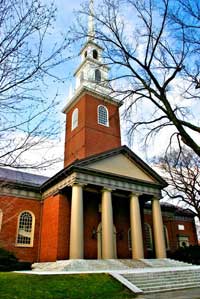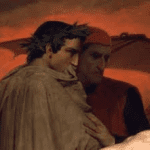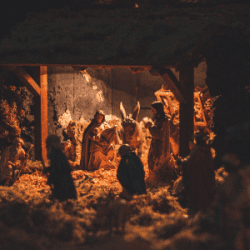By R.R. Reno
 A few years ago, the academic mandarins in Cambridge embarked on a round of curricular revision. This does not surprise. The no-there-there Core developed in the 1960s was never coherent. It endorsed the suspect "teaching ways of thinking" approach to education that basically divided up requirements among various departments. Philosophers taught students "how to analyze arguments," English classes "how to interpret," science classes "how to think scientifically," and so forth. The implicit rationale was understandable: Faculty figured, hey, we are the university, and students should learn to think like us. But in the ideologically fraught atmosphere of the ‘60s, it was impossible to give a clear rationale for why students needed to learn how to think in any particular way at all.
A few years ago, the academic mandarins in Cambridge embarked on a round of curricular revision. This does not surprise. The no-there-there Core developed in the 1960s was never coherent. It endorsed the suspect "teaching ways of thinking" approach to education that basically divided up requirements among various departments. Philosophers taught students "how to analyze arguments," English classes "how to interpret," science classes "how to think scientifically," and so forth. The implicit rationale was understandable: Faculty figured, hey, we are the university, and students should learn to think like us. But in the ideologically fraught atmosphere of the ‘60s, it was impossible to give a clear rationale for why students needed to learn how to think in any particular way at all.
Apparently, the Harvard faculty is now ready for consensus. The recently published Final Report of the Task Force on General Education presents a strikingly cogent account for general education. The report encourages firmer, more substantive, more coherent expectations for the general education of undergraduates. As a result, we now have a useful, readable constitution for postmodern undergraduate education in America. The only problem is that it is a constitution for an intellectual and moral banana republic.
According to ancient usage, study is liberal because it is not servile. It is free to the extent that it serves no vocational or practical purpose. In our age, this basic sense is largely preserved. We send eighteen-year-olds off to college rather than to professional schools, and, for a large part of four years, students take classes in subjects with no obvious relevance to their future jobs. Thus, in the ancient sense, they are educated liberally.
The Harvard Final Report thoroughly endorses liberal education. The undergraduate years should not be thought of simply as a preliminary to professional training; instead, "it is preparation for life." But what sort of preparation? The report reflects the dominant view of contemporary academia. Although there is a nod toward the objectivity of scientific knowledge, the emphasis falls on the therapy of critique. "The aim of a liberal education," we read, "is to unsettle presumptions, to defamiliarize the familiar, to reveal what is going on beneath and behind appearances, to disorient young people."
The same basic picture emerges as the report details the new set of required courses. In the main, the report asks for students to be exposed to the integrity of modern scientific inquiry. "General education courses in the Sciences of the Physical Universe," we are informed, "teach central facts and concepts in the physical sciences and engineering." The same holds for the life sciences. Yet the courses dealing with history, cultures, societies, and moral ideas have a quite different tone. Where Harvard students should be competent in science, they should be critical in culture.
Let's take a look at the core category that might involve the study of literature: "Aesthetic and Interpretive Understanding." One might think that a class on Shakespeare, for example, would have as its goal an encounter with the content of his plays. But it appears not to be so. "Students," we learn, "should know how to ‘read' cultural and aesthetic expressions."
The scare quotes are telling. A Harvard student will not so much be taught to read Shakespeare as learn how to "read" him, which means understanding the "dynamics of culture" encoded into his poetry and plays. This should not surprise. The goal is "to help students understand themselves and others as products of and participants in traditions of culture and belief," so that they can "understand how meanings are produced and received." Cultural studies, in other words, supplants the humanities. It's not what Shakespeare says that matters; it's his role as factory that produces meaning.
The same holds for another core category: "Culture and Belief." Here again the ideas and the arguments that the authors give are not the focus. Instead, students are encouraged to put works "in context -- to see how social, political, and economic, and cross-cultural conditions shape the production and reception of ideas and works of art." Apparently, when it comes to culture and belief, the liberally educated student does not entertain the question of truth. We're back to the economics of culture.
The category of "Ethical Reasoning" holds out some hope of engaging substantive claims about how to live. But even here the emphasis falls on becoming aware of hidden assumptions, learning how to live with people whose "value systems" differ, and acquiring the critical detachment necessary for students to "choose for themselves what principles will guide them." What students choose to believe is apparently beyond the concern of the Harvard vision of the liberally educated man and woman.




